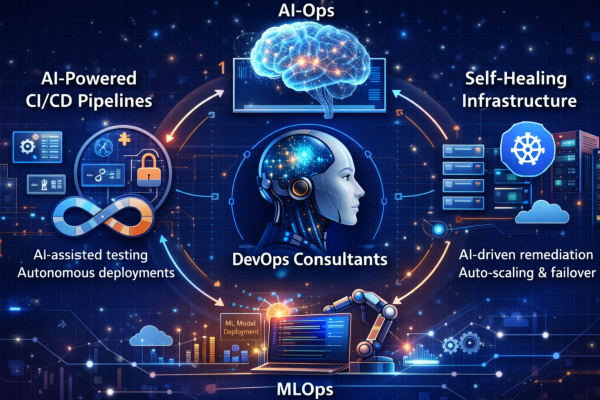Revolutionizing ML Deployments: The DevOps Consulting Advantage on ECS
Deploying machine learning (ML) models at scale is a complex task that involves multiple challenges, including infrastructure management, scalability, automation, and monitoring. With the rise of containerization technologies like Amazon ECS (Elastic Container Service), organizations now have the flexibility and tools needed to run ML workloads efficiently. However, the real game-changer in this space is the strategic integration of DevOps Consulting Services, which brings automation, reliability, and performance optimization to ML deployments on ECS.
This blog explores how DevOps Consulting Services enhance ML deployment workflows on ECS, ensuring scalability, cost-efficiency, and faster time to market.
The Role of DevOps in Machine Learning Deployments
Machine Learning operations (MLOps) require a combination of data science, software engineering, and infrastructure management. DevOps brings automation, CI/CD pipelines, version control, and monitoring into the ML lifecycle. By applying DevOps principles, businesses can move from experimentation to production quickly and reliably.
When combined with ECS, DevOps practices ensure that ML models are containerized, version-controlled, tested, and deployed automatically with minimal manual intervention. This results in smoother workflows, fewer errors, and higher scalability.
Why ECS for ML Deployments?
Amazon ECS is a fully managed container orchestration service that allows businesses to run containerized applications at scale. ECS is especially suitable for ML deployments because:
- It supports both CPU and GPU-based tasks.
- It integrates seamlessly with AWS services like S3, IAM, CloudWatch, and SageMaker.
- It offers flexibility through EC2 launch type and Fargate (serverless containers).
- It provides advanced networking and load balancing.
However, to fully leverage ECS for ML, organizations need to adopt DevOps practices for automation, monitoring, scaling, and cost control — this is where DevOps Consulting Services become essential.
Key Advantages of DevOps Consulting Services in ECS-Based ML Deployments
1. Automated CI/CD Pipelines for ML Models
ML models often require frequent updates, retraining, and testing. DevOps Consulting Services implement robust CI/CD pipelines that automate the packaging, testing, and deployment of models into ECS containers.
These pipelines:
Ensure consistent model versioning.
Enable automated rollback in case of failure.
Support continuous integration of data preprocessing and model training code.
Reduce manual effort and errors during deployment.
By automating these steps, businesses can deploy ML models faster, more reliably, and more frequently.
2. Scalable Infrastructure with Infrastructure as Code (IaC)
Managing ML infrastructure manually can be resource-intensive. DevOps Consulting Services use tools like Terraform or AWS CloudFormation to provision and manage ECS clusters and related resources using Infrastructure as Code.
This approach:
Enables repeatable and consistent environment creation.
Supports scaling infrastructure up or down based on demand.
Reduces configuration drift and human errors.
Enhances collaboration between data science and operations teams.
Through IaC, organizations achieve greater agility and can deploy ML models at scale without infrastructure bottlenecks.
3. Advanced Monitoring and Logging
ML workloads require detailed monitoring to ensure performance, availability, and cost-efficiency. DevOps Consulting Services set up comprehensive monitoring using tools like CloudWatch, Prometheus, and Grafana, integrated with ECS.
Monitoring covers:
Container health and resource usage (CPU, memory, GPU).
Application-level metrics (model latency, inference errors).
Logs for debugging and auditing.
With real-time alerts and dashboards, teams can proactively address issues, optimize resource usage, and ensure the reliability of ML services.
4. Efficient Resource Management and Cost Optimization
ECS allows running ML containers on EC2 instances or Fargate. DevOps Consulting Services help select the right deployment strategy based on cost and performance requirements.
Key practices include:
Right-sizing EC2 instances for training or inference workloads.
Using spot instances for cost savings during non-critical tasks.
Autoscaling ECS services based on load and utilization.
Managing GPU resources efficiently.
This strategic resource management ensures that ML workloads run efficiently without over-provisioning or overspending.
5. Security and Compliance Automation
Security is critical in ML deployments, especially when handling sensitive data. DevOps Consulting Services implement security best practices and compliance automation in ECS-based environments.
Key features include:
Automated IAM role assignments with least privilege.
Secure storage and transmission of ML data (encryption at rest and in transit).
Integration with AWS Secrets Manager for managing credentials.
Automated compliance checks using tools like AWS Config and GuardDuty.
Security automation reduces risks, ensures regulatory compliance, and builds trust in ML services.
6. Model Lifecycle Management with Version Control
In ML, managing model versions, datasets, and configurations is vital for reproducibility. DevOps Consulting Services enable model lifecycle management using version control systems like Git and tools like MLflow or DVC.
This allows:
Tracking changes in model code and parameters.
Reproducing past results.
Collaborating across data science and operations teams.
By applying DevOps principles, ML models become easier to manage, audit, and improve over time.
7. Disaster Recovery and High Availability
ML services need to be resilient and available 24/7. DevOps Consulting Services help build high-availability architectures on ECS, including multi-zone deployments and automated failover strategies.
They also implement:
Backup automation for datasets and models.
Disaster recovery plans with minimal downtime.
Load balancing and auto-healing of ECS tasks.
This ensures business continuity even in the event of infrastructure failures.
8. Integration with Data Pipelines and Workflow Orchestration
ML deployments often rely on data pipelines for preprocessing, training, and inference. DevOps Consulting Services integrate ECS with workflow orchestration tools like Apache Airflow or AWS Step Functions.
This integration enables:
Automated triggering of ML workflows.
Scheduling of training jobs and batch inferences.
Event-driven processing for real-time ML applications.
Such orchestration brings efficiency and coordination across the entire ML lifecycle.
9. Customization and Optimization of ECS Task Definitions
DevOps Consulting Services optimize ECS task definitions for ML workloads by tuning resource allocations, startup scripts, environment variables, and logging configurations.
These optimizations result in:
Faster container startups.
Better resource utilization.
Simplified debugging and monitoring.
Customization ensures that ML deployments are not only functional but also efficient and robust.
10. Faster Time to Market for ML Products
Speed matters in today’s competitive landscape. DevOps Consulting Services help organizations move ML projects from development to production quickly.
By reducing manual steps, ensuring automation, and enabling scalable infrastructure, DevOps accelerates the delivery of ML-powered features and products to end-users.
This leads to:
- Improved innovation cycle.
- Competitive advantage.
- Higher ROI from ML initiatives.
Conclusion
The integration of DevOps Consulting Services with ECS transforms how organizations deploy, manage, and scale machine learning workloads. From automation and scalability to cost optimization and security, DevOps brings a structured, efficient, and reliable approach to ML deployments.
For businesses looking to operationalize their ML models and deliver value at scale, investing in DevOps practices and consulting expertise is no longer optional — it’s a strategic necessity. ECS provides the perfect foundation, and DevOps unlocks its full potential for machine learning success.
Author







